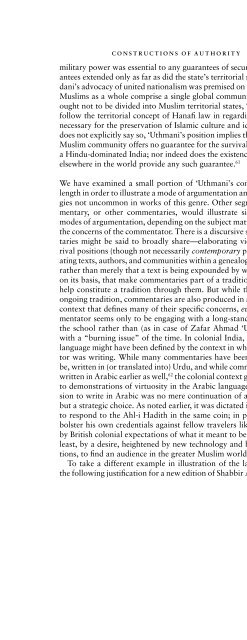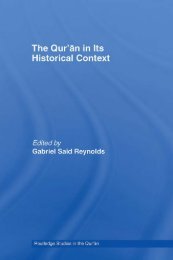Download (1 MB) - Islam and Christian-Muslim Relations: Articles ...
Download (1 MB) - Islam and Christian-Muslim Relations: Articles ...
Download (1 MB) - Islam and Christian-Muslim Relations: Articles ...
You also want an ePaper? Increase the reach of your titles
YUMPU automatically turns print PDFs into web optimized ePapers that Google loves.
CONSTRUCTIONS OF AUTHORITY 49militarypower was essential to anyguarantees of security, but such guaranteesextended onlyas far as did the state’s territorial reach. 60 While Madani’sadvocacyof united nationalism was premised on the conviction that<strong>Muslim</strong>s as a whole comprise a single global community(umma), whichought not to be divided into <strong>Muslim</strong> territorial states, ‘Uthmani seems tofollow the territorial concept of Hanafi law in regarding political powernecessaryfor the preservation of <strong>Islam</strong>ic culture <strong>and</strong> identity. Though hedoes not explicitlysayso, ‘Uthmani’s position implies that the world-wide<strong>Muslim</strong> communityoffers no guarantee for the survival of the <strong>Muslim</strong>s ina Hindu-dominated India; nor indeed does the existence of <strong>Muslim</strong> stateselsewhere in the world provide anysuch guarantee. 61We have examined a small portion of ‘Uthmani’s commentaryat somelength in order to illustrate a mode of argumentation <strong>and</strong> rhetorical strategiesnot uncommon in works of this genre. Other segments of this commentary,or other commentaries, would illustrate similar or differentmodes of argumentation, depending on the subject matter in question <strong>and</strong>the concerns of the commentator. There is a discursive style that commentariesmight be said to broadlyshare—elaborating viewpoints; refutingrival positions (though not necessarily contemporary positions); <strong>and</strong> situatingtexts, authors, <strong>and</strong> communities within a genealogy. It is such things,rather than merelythat a text is being expounded bywriting another oneon its basis, that make commentaries part of a tradition <strong>and</strong>, conversely,help constitute a tradition through them. But while theyare part of anongoing tradition, commentaries are also produced in a precise historicalcontext that defines manyof their specific concerns, even when the commentatorseems onlyto be engaging with a long-st<strong>and</strong>ing debate withinthe school rather than (as in case of Zafar Ahmad ‘Uthmani’s treatise)with a “burning issue” of the time. In colonial India, even the choice oflanguage might have been defined bythe context in which the commentatorwas writing. While manycommentaries have been, <strong>and</strong> continue tobe, written in (or translated into) Urdu, <strong>and</strong> while commentaries had beenwritten in Arabic earlier as well, 62 the colonial context gave a new impetusto demonstrations of virtuosityin the Arabic language. ‘Uthmani’s decisionto write in Arabic was no mere continuation of an age-old practicebut a strategic choice. As noted earlier, it was dictated in part bythe needto respond to the Ahl-i Hadith in the same coin; in part bythe need tobolster his own credentials against fellow travelers like Madani; in partbyBritish colonial expectations of what it meant to be an ‘alim; <strong>and</strong>, notleast, bya desire, heightened bynew technology<strong>and</strong> better communications,to find an audience in the greater <strong>Muslim</strong> world.To take a different example in illustration of the last point, considerthe following justification for a new edition of Shabbir Ahmad ‘Uthmani’s



